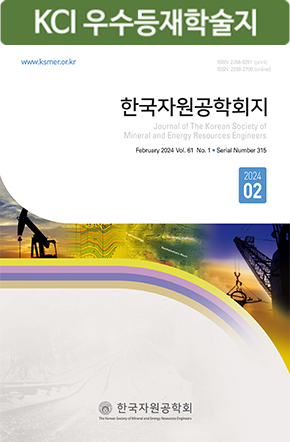Research Paper (Special Issue)
- Publisher :The Korean Society of Mineral and Energy Resources Engineers
- Publisher(Ko) :한국자원공학회
- Journal Title :Journal of the Korean Society of Mineral and Energy Resources Engineers
- Journal Title(Ko) :한국자원공학회지
- Volume : 57
- No :4
- Pages :362-371
- Received Date : 2020-07-06
- Revised Date : 2020-08-07
- Accepted Date : 2020-08-25
- DOI :https://doi.org/10.32390/ksmer.2020.57.4.362



 Journal of the Korean Society of Mineral and Energy Resources Engineers
Journal of the Korean Society of Mineral and Energy Resources Engineers








